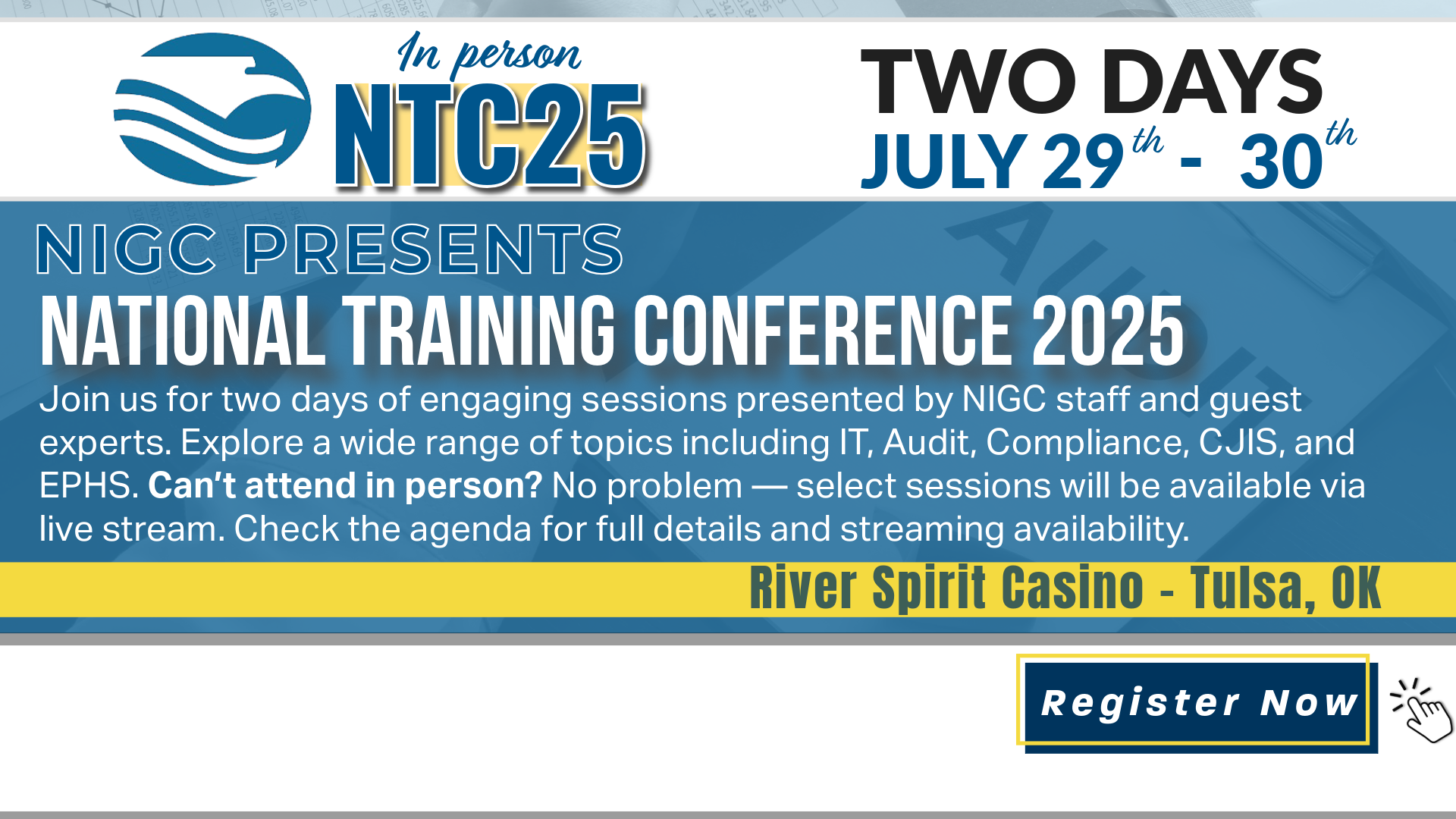| Date | Publication Number | Title | Topic |
|---|---|---|---|
| 11/09/2007 | No. 2007-3 | Office of Foreign Asset Control (OFAC) Compliance |
Office of Foreign Asset Control (OFAC) Compliance
November 9, 2007
Bulletin 2007-3
Subject: Office of Foreign Asset Control (OFAC) Compliance
The Indian Gaming Working Group (IGWG) is comprised of federal agencies that enforce various federal laws and regulations applicable to the tribal casino industry. IGWG meets regularly to disseminate and share information regarding investigations, prosecutions, and compliance training pertinent to tribal gaming. Members of the IGWG include, but are not limited to, NIGC, U. S. Attorneys, FBI, and IRS. The Federal Bureau of Investigations (FBI) has taken the lead role in coordinating conferences and agendas, and facilitating regular interagency conference calls and communication.
During the course of this information sharing, NIGC has become aware of the economic and trade sanctions administered and enforced by the Office of Foreign Assets Control (OFAC), an office of the U.S. Treasury Department. These sanctions, which are based on U.S. foreign policy and national security goals, target specific countries (e.g., Cuba, Iran, Sudan) and specifically designated individuals and entities who engage in illicit activities, such as drug trafficking, terrorism, and proliferation of weapons of mass destruction. OFAC acts under the President’s wartime and national emergency powers, as well as authority granted by specific legislation, to impose controls on transactions and to freeze assets under U.S. jurisdiction.
To enforce U.S. sanctions aimed at individuals and entities, OFAC periodically publishes names on a list referred to as the “Specifically Designated Nationals” (SDN) list. All U.S. persons, including tribal casinos, must take reasonable steps to ensure that illicit transactions involving targeted countries and SDNs are interdicted.
It is important to note the OFAC requirements are separate and distinct from the requirements of the Patriot Act and the Bank Secrecy Act, which are primarily enforced by the Financial Crimes Enforcement Network (FinCEN). FinCEN deals primarily with money laundering schemes and other financial crimes, while OFAC enforces economic sanctions as a tool of U.S. foreign policy. Because both OFAC and FinCEN share a common national security goal, institutions often confuse compliance with the Patriot Act and BSA requirements as compliance with U.S. sanctions laws. This distinction should be considered when tribal casinos structure their compliance programs.
Tribal casinos deal with a high volume of financial transactions that pose a risk of illicit activity. These transactions include cash or credit accounts; electronic transfer of funds into or out of accounts established by or on behalf of a foreign national; and money transfers to and from high risk countries. In order to make sure that these types of transactions, and other services performed by the tribal casinos, do not violate U.S. sanctions law, it is recommended that all such financial transactions be screened against names on the OFAC SDN list. The list is available on OFAC’s website and is updated frequently. During the course of screening transactions for names on the SDN list, if a “hit” is experienced and verified as a true match, there are additional requirements which entail blocking the funds and notifying OFAC. Unlike the anti money-laundering requirements or cash transaction reporting under the Patriot Act and the BSA, there is no minimum dollar level for blocking and reporting transactions involving individuals and entities on the SDN list.
There are both criminal and civil penalties for violating OFAC regulations. Criminal penalties can be a fine of up to $1 million and imprisonment of up to 20 years, while civil penalties can be twice the value of the financial transaction giving rise to the violation or $250,000, whichever is greater. We urge all tribal gaming operators and regulators to take this matter seriously and include OFAC requirements as part of their overall compliance program. Additional detailed information on OFAC regulations and compliance requirements can be found on the OFAC website at www.treas.gov/OFAC. OFAC contact information can also be found on the website.










